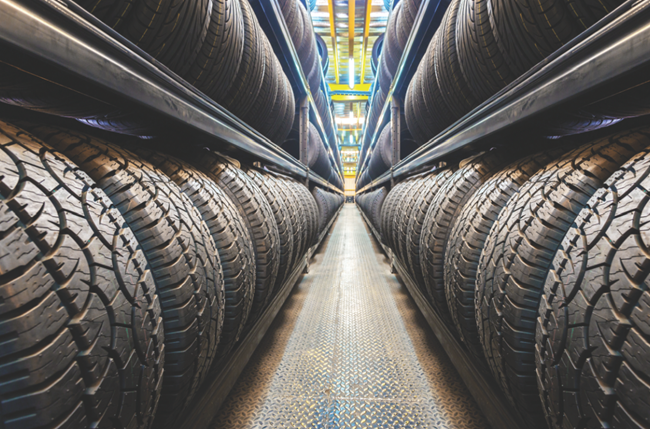We use cookies to ensure that we give you the best experience on our website. If you continue without changing your settings, we will assume that you are happy to receive all cookies on the Business Car website. However, if you would like to, you can change your cookies at any time

The start point for the best source of fleet information |
New tech calls for fleet tyre focus
Date: 20 October 2023 | Author: Sean Keywood

Fleets need to be paying more attention to tyres, with new innovations set to shake up the market, an expert has said.
David Legg, director of tyres for i247 Group. Is the author of a soon-to-be-published white paper entitled 'The evolving tyre landscape: What fleets need to know', discussing developments in tyre technology and the impact of other trends such as the rise of EVs.
Legg believes that elements of fleet EV deployment in fact offer something of a roadmap for what not to do when it comes to adopting new tyre technology.
He told Business Car: "Seeing what happened with the debacle with EVs, and how no one understood what an EV policy was and how they should be managed . there was a lot of confusion which didn't lead to the best driver journeys.
"We want to make sure that we don't follow that same path [with tyres]."
Among the issues Legg hopes new tyre technology can solve is a rising number of illegal tyres being found on fleet vehicles, which he attributed to factors including driver shortages causing checks to be missed, and a trend for bigger wheels to be fitted to both EVs and ICE vehicles.
He said: "Tyres, [like] a lot of subjects about health and safety seem to have dropped down the fleet agenda, because the agenda has been taken over by EVs, and the problem of shortages of staff.
"The message needs to be pushed to the industry that tyres are one of the most vital points on a vehicle, and we should be checking them regularly.
"From our data, with our customers, we are seeing a rise [in illegal tyres], and are working heavily with them to get that down."
Legg explained that connected and smart tyres were on the way, and could play a key role in solving this problem.
He said: "You're talking about a tyre that can actually tell someone if the tread depth is at 2mm, whether the driver, the OEM, the fleet manager.
"What we are having now to do is send back the data to t companies to show them where an illegal tyre has come off. That way they can take it up with the driver.
"The only way to do it is reactively rather than proactive, which is why it's going to be so important to have a smart proactive solution."
Among the other technical innovations highlighted by Legg are airless tyres, potentially solving issues such as punctures and wrong tyre pressures entirely - although he predicted these would find more favour on commercial vehicles than cars.
EVs are often named as having higher tear wear rates than ICE models, due to factors such as extra weight from batteries, and higher levels of torque from electric motors. However, while Legg acknowledged that this was generally the case at the moment, he said the gap was closing - and that wear rates could vary greatly between different models.
He said: "We're seeing some EVs achieving fantastic mileages. The Hyundai Ioniq 6 has a Hankook fitted and in America they guarantee it for 50,000 miles, which breaks all the stereotypes of an EV tyre.
"For someone to come out with a broad statement that EVs wear out quicker - probably on average they do now, but it doesn't say that your Tesla won't do 25,000 miles on a set. It is still new technology, and new tyres are coming out."
One of the aspects discussed in Legg's white paper is the need for tyre performance considerations to be balanced against their environmental impact, with grippier tyres said to not necessarily be the best choice if they produced more harmful particulates.
When asked by Business Car how fleets should balance these arguments - with us suggesting safety should always be the priority - Legg said it might vary based on different use cases.
He said: "My personal opinion is if I was sat with a utility fleet in Scotland, I would definitely be going with an all-season tyre. If everything is scored out of 100, I'd be going with the one that's 100 for grip and safety, and 98 for environmental.
"But if I was in London, I'd be going the other way round, with environmental issues over grip, because I'm not doing over 30mph and I probably want the tyre that is most robust.
"We want everybody to talk to their tyre manufacturer, tyre fitter, to put that fleet's expertise alongside the expertise of the tyre fitters, and they will help you, they want to give their customers the best customer journey."
Tyres are potentially a big difference maker for fleets, with Legg saying i247 had found one customer could save nearly £1 million over five years by using a particular brand of tyre for its fleet. However, he said this was not a finding that could be universally applied, and that fleets would have to reach their own conclusions.
He said: "If you start today, or with the data you've got, that will give you your answers for tomorrow. Nearly every job for the last four, five years across the industry has been put into a point of sale, with tread depths on, tread depths off, with mileage, so you are able to look at that data and calculate.
'Using other people's data is never right, because no two fleets act the same."











